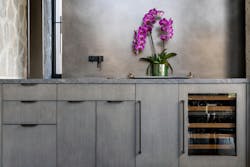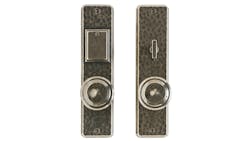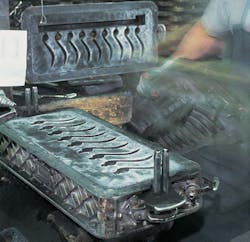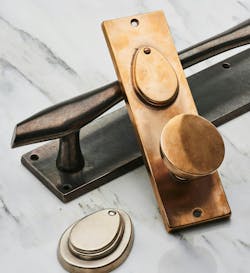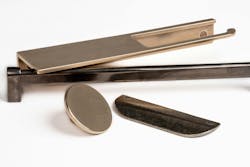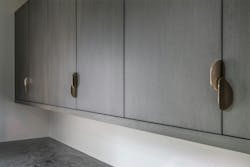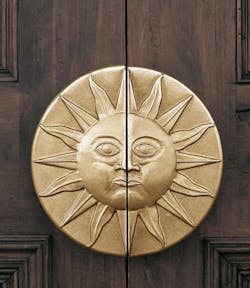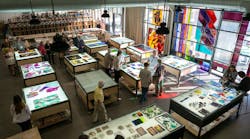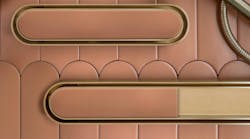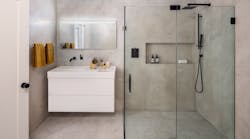From One Custom Request to a Million Pieces: The Rocky Mountain Hardware Story
Story at a Glance
• Rocky Mountain Hardware grew from one custom request to producing 1 million bronze pieces annually while keeping all manufacturing in-house in Idaho.
• The company is known for rustic mountain hardware but has adapted techniques to add in sleek contemporary designs.
• Their domestic production model became a competitive advantage during supply chain and tariff disruptions, capturing opportunities while competitors struggled.
Welcome to our Made to Order series, where we spotlight artisans and innovators behind the products that make their way into custom builds. Read earlier profiles on Concretti Designs and Judson Studios.
Thirty years ago, a single question from a discerning client in Sun Valley, Idaho, reshaped an industry. The client loved the custom doors Mark and Patsy Nickum had built for her home, but when she asked if they could source hardware with the same level of craftsmanship, the couple hit a wall. Nothing in their showroom matched the quality she had in mind.
So, they decided to make it themselves.
To produce that first piece, the Nickums turned to a local art foundry experimenting with bronze casting. And what started as a one-off solution quickly grew into a new venture, setting the direction for what would become Rocky Mountain Hardware, a company defined by hand-cast bronze and a commitment to custom.
Today, that business is led by their son, Christian Nickum, who grew up in the shop and joined full-time in 1997, just as the company began expanding beyond Sun Valley.
"My dad put me in charge of production," Nickum says, "so, along with my father and a couple of other guys, we developed the production methods and techniques to create the business. And it really took off. The snowball just started to roll."
What made the company stand out early on was its hands-on technique, says Nickum. "It was a handmade, hand-cast product that, at that point in time, was more rustic than most people had seen," he says. "It has a great feel compared to a typical forged handle, or plated hardware."
It was also about the material itself. Bronze develops a natural patina over time, the so-called "living finish," giving each piece a unique character. "It was an organic, earthy approach," says Nickum. "That's where the home run came in."
Each piece is touched by 50 different hands as it comes through our production facilities.
- Christian Nickum, president, Rocky Mountain Hardware
Scaling Without Outsourcing
Today, Rocky Mountain Hardware pours roughly 750,000 pounds of bronze alloy and produces up to 1 million individual pieces each year—from a tiny cabinet knob to a 300-pound sink—for projects from Jackson Hole to Manhattan.
That progress didn't come easy. While many companies grow by outsourcing, Nickum took great pains to keep production entirely in-house. This was achieved by systematizing production across three Idaho facilities.
Every piece begins at the Blackfoot, Idaho foundry, where molten bronze is poured into sand molds. The pieces then move to a facility in Shoshone, Idaho for grinding, deburring, and machining. The final steps, including finishing, assembly, and shipping, take place at the company's headquarters in Hailey, Idaho.
"Each piece is touched by 50 different hands as it comes through our facilities," Nickum says.
This hands-on process gives the company the flexibility to adapt to a project's specific needs, whether it's tweaking a finish or a handle's dimensions.
In fact, Nickum says that much of the company's existing collection grew directly from these custom requests, with his own experience in the foundry giving him practical insight into what's feasible.
"It's really helped me understand our capabilities," he says. "So, as we get approached by the design community, we can say, 'we can do that, but we'll need to make these slight changes.' It's a dance with the customer."
Rocky Mountain seems to have mastered this balance between creating efficiencies and producing custom work. While 10% to 20% of their current output is entirely custom, even their standard line offers extensive configurations, including 26 architectural backplate styles, 110 lever and knob choices, and a dozen finishes. This expansive catalogue allows designers to achieve a cohesive aesthetic without requiring entirely new molds for each project.
"In the early days, it was almost all one-offs," Nickum says. "When we started doing collections, it gave people something to hang their hat on. Then, if they wanted to tweak something, we could do it."
Mountain Rustic to Mountain Modern
Rocky Mountain's style evolution mirrors its operational growth. Early hardware was a heavy, textured bronze that reflected the rustic log homes, ski lodges, and mountain architecture of the region.
"We developed different patinas and casting techniques that would really match that aesthetic," says Nickum. Craftsmen would intentionally create pits and voids in pieces "to make it look like it's been there for a million years," he says.
But as client tastes evolved, so did the company. Nickum says clients began asking for cleaner, more modern designs. Today, Rocky Mountain produces a spectrum of traditional and contemporary styles that fit neatly in what the industry calls 'Mountain Modern'.
"Over the years, we've really adapted our processes and casting methods to be able to play in all arenas," he says.
This evolution required a refinement of techniques. To achieve the sleek, contemporary looks customers wanted, Nickum's team began using finer sands that pack tighter, resulting in better, cleaner casting. The bronze itself remains central, valued for its “tactile warmth” and natural patina, but newer silicon bronze and white bronze alloys, along with updated casting and finishing techniques, allow for sleeker forms and polished finishes that work equally well with the stone surfaces or reclaimed wood being mixed into these more contemporary projects.
Another way the company stays relevant is through collaborations with architects and designers, including collections with the Ketchum, Idaho interior design firm Suede Studio and with musician Lenny Kravitz's firm, Kravitz Design. These projects push Rocky Mountain beyond technical innovation, tapping into new aesthetics and introducing the brand to broader design audiences.
There aren't many foundries left in the United States doing what we're doing.
- Christian Nickum, president, Rocky Mountain Hardware
The Homegrown Advantage
Rocky Mountain's domestic production model has gained fresh relevance amid supply chain disruptions and growing interest in sustainable practices. All hardware is cast from 100% recycled alloys, and keeping manufacturing in Idaho reduces freight costs and lead times compared with imported alternatives.
"There aren't many foundries left in the United States doing what we're doing," says Nickum. "Based on that, the door continually opens and gives us new opportunities."
The model also creates resilience. While competitors struggled with overseas supply chains during the pandemic or, more recently, face unexpected tariffs, Rocky Mountain captured new opportunities, even in the mid-market. Its Builder Series line offers a lower entry point, while RMH Express guarantees delivery in 10 days on made-to-order hardware. "It's still customizable," Nickum says, "but faster and easier for projects that need it."
That production control also allows the company to balance custom work with impressive volume. Rocky Mountain produces 400 to 500 new molds each year, with lead times of four to eight weeks for standard products and eight to ten weeks for full custom pieces. Each project moves from sketch or reference photo to CAD drawings, mold-making, casting, machining, and hand-finishing.
"There's endless opportunity," Nickum says, "but we focus on growing organically instead of chasing projects outside our wheelhouse that would distract us from what put us on the map. Bigger isn't always better."
That focus allows the company to serve markets as varied as ultra-custom mountain homes, W Hotels, and historic Church of Jesus Christ of Latter-Day Saints temples; projects demanding everything from high-volume polished finishes to exacting historic reproductions in brass alloys.
From a single custom request to a nationwide reputation, it's been a remarkable journey, Nickum says, demonstrating that, even in an era of mass production, there's still enduring value in marrying traditional craft with modern scale.
At its core, Nickum sees the draw is fundamentally human: "Everybody just wants to see their ideas brought to life."
In Case You Missed It...
About the Author
Pauline Hammerbeck
Pauline Hammerbeck is the editor of Custom Builder, the leading business media brand for custom builders and their architectural and design partners. She also serves as a senior editor for Pro Builder, where she directs products coverage and the brand's MVP Product Awards. With experience across the built environment - in architecture, real estate, retail, and design - Pauline brings a broad perspective to her work. Reach her at [email protected].
